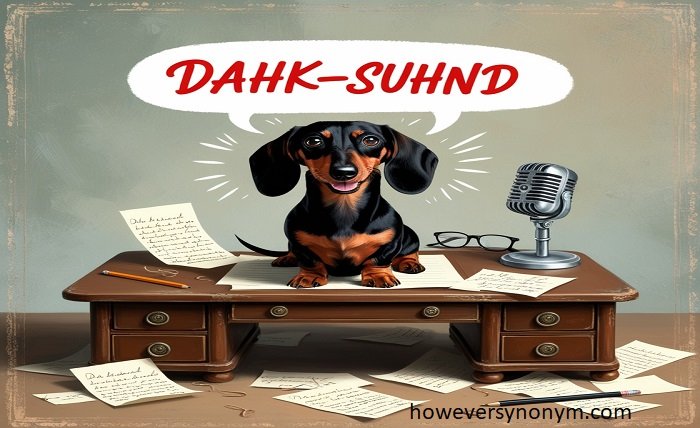Introduction
With its unusual look and lively demeanor, the dachshund has won over dog lovers everywhere. This German breed was first created for the purpose of hunting small animals, such as badgers. Its Germanic name is a reflection of its past and present. But pronouncing “dachshund pronunciation” correctly can be confusing, particularly for people who are not familiar with German phonetics.
Origin of the Dachshund Name
The word “dachshund pronunciation” comes from the German word “Dachs,” which means badger, and the word “Hund,” which means dog. The name literally means “badger dog,” referring to the original function of the breed as a badger hunter. This compound name emphasizes the hunting function and unique qualities of the dachshund. When a phrase is employed outside of its native context, it might cause confusion and mispronunciations due to the distinctive sounds in German pronunciation, which do not necessarily match up with English phonetics.
Correct Pronunciation: A Step-by-Step Guide
Correctly pronouncing “dachshund pronunciation” requires a methodical process that begins with dissecting the word into its constituent parts: “dachs,” “hund,” and the final “-und.” When pronouncing “dachs,” say “dahks,” with a strong “k” sound for the “ch.” The next pronunciation of “hund” is “hoont,” with a soft “u” that sounds like “hood.” The final pronunciation of the “-und” portion is “oont,” with the “oo” sounding like in “food.” When these elements are put together correctly, the pronunciation becomes “dahks-hoont,” which is near to the German pronunciation and guarantees clarity when talking about this well-liked breed.
Common Mispronunciations
The reason behind mispronouncing “dachshund” is frequently a lack of acquaintance with German phonetics. Both “dachshund pronunciation,” which shortens the term to meet English phonetics, and “dack-sund,” where the “dach” portion is pronounced erroneously with a hard “a,” are examples of common mispronunciations. Another common mispronunciation is “dach-sand,” which is “hund” pronounced incorrectly as “sand.” These mispronounced words show a lack of knowledge about German phonemes and might cause misunderstandings, particularly when the breed is discussed in different contexts.
Why Pronunciation Matters
Pronouncing “dachshund pronunciation” correctly is crucial for a number of reasons. It honors the German ancestry of the breed and demonstrates respect for its beginnings. Proper pronunciation facilitates straightforward communication and helps avoid misconceptions while talking about the breed with other people, especially in formal or educational settings. Furthermore, keeping the term’s linguistic integrity intact by pronouncing it correctly ensures that the breed’s name is used consistently in all languages and cultures.
Tips for Remembering the Correct Pronunciation
Several useful suggestions will help you remember how to pronounce “dachshund pronunciation” correctly. To start pronouncing the word correctly, consider its Germanic origins. This will help you match the sounds in the original language. Remembering words by association, such as “dach” for “roof” and “hund” for “hound,” can also help in recall. You may also improve your pronunciation by listening to recordings of native German speakers while you practice. This will help you internalize the correct manner of saying “dachshund.”
Pronunciation in Different Languages
Due to variations in phonetic systems and accents, the word “dachshund” is pronounced differently in many languages. The term is mispronounced as “dash-hound” or “dack-sund” in English, although it is pronounced more like the German original in French, albeit with a tiny French accent. The pronunciation in Spanish can be roughly translated as “dachshund pronunciation,” indicating an effort to match German phonemes. These differences draw attention to how difficult it can be to pronounce words consistently across linguistic boundaries.
Cultural Impact on Pronunciation
The pronunciation of “dachshund pronunciation” is greatly influenced by cultural factors. Variations result from pronunciation frequently adjusting to local phonetic standards in nations where German is not the primary language. These cultural adjustments may cause pronunciations of German words to differ from their original form, illustrating the ways in which language and culture interact to influence how we pronounce foreign words. It is easier to appreciate the variety of ways that “dachshund” is pronounced around the world when one is aware of these influences.
Dachshund Pronunciation in Popular Media
The pronunciation of “dachshund” in popular media varies greatly, frequently due to the accents or regional dialects of the actors. For example, the breed’s name may be pronounced incorrectly in movies and TV shows, like “dash-hound” or dachshund pronunciation,” which can cause misunderstanding among the general population. In order to make the pronunciation more understandable to a wider audience, advertisements may also make it simpler. The necessity for precise pronunciation is highlighted by the fact that these media portrayals may have an impact on how people understand and pronounce the breed’s name.
Conclusion
In addition to demonstrating respect for the breed’s heritage, knowing and utilizing the proper pronunciation of “dachshund pronunciation” improves communication amongst dog lovers. With some practice and familiarity with the German pronunciation, you will be able to speak of this endearing breed with confidence.
FAQ
Why is “dachshund” pronounced differently in various languages?
Because different languages have different phonetic systems and accents, “dachshund pronunciation” is pronounced differently in each language. There may be deviations from the original German pronunciation due to the way each language modifies the pronunciation to suit its own phonetic standards.
Is there a simple way to remember the correct pronunciation of “dachshund”?
Indeed, it might be helpful to practice using audio resources and to associate the pronunciation with known sounds. Always keep in mind that the word “dachshund” should sound like “dahks-hoont,” emphasizing the soft “ch” and “oo”.

